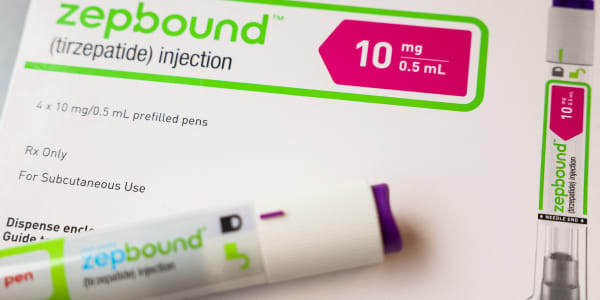
J. Craig Venter, the superstar geneticist who mapped the first human genome in 2000, has a new challenge: decoding death. With a battery of genetic tests that can cost anywhere from $4,950 to $25,000, Venter believes he can uncover the deadly diseases lurking within seemingly healthy individuals.
"We do a full genome on everyone. Compare [that] to what is found in the clinic and we find [more data]," said Venter, executive chairman and head of scientific strategy at Human Longevity, a health firm where the goal is to stay ahead of aging and illness. He described the company as a "good detective … making discoveries, not diagnoses."
The firm's Health Nucleus focuses on four primary areas: cancer detection, cardiac disease, metabolic disease, and neurodegenerative and neurovascular diseases.
Venter's company has found serious detections in roughly 40 percent of patients, and many of the discoveries are found much earlier than they would have been found previously via traditional testing. They are finding cancerous tumors that are in phase 0 and 1 in patients who are experiencing no pain, whereas most people are often diagnosed in phase 4, where pain is prevalent and the disease is more difficult to beat.
"Thus far, for the first few thousands, we only saw people who considered themselves fully healthy," Venter said. "They feel good, they look good, but we're finding detections [in them]."
Patients who go through the complete Health Nucleus program — which includes an all-encompassing MRI test and bone density scans among other comprehensive lab work in addition to a full genome — can expect 300 to 400 pages of data about their health.
Human Longevity's latest HNX Platinum membership costs an initial $25,000 but covers three years of testing. After three years the cost is $6,000 each year for additional testing. The HNX membership, which includes the whole genome sequencing and the full body MRI, has a price of $4,950 for the first year and $2,950 for each year thereafter.
One of Venter's early test subjects and success stories: himself. He went through the traditional medical system and was told that his prostate was simply enlarged but that his biopsy was negative. Human Longevity, though, found early signs of cancer. Now, after proper treatment, he lives cancer free.
Only a small fraction of people live into their 90s. We hope to get people in the 90 to 100 range. I'm hoping to make it into triple digits.Craig Venterexecutive chairman and head of scientific strategy at Human Longevity
The company has detected cancer in 5 percent of people over the age of 50 who didn't know they had it. One percent of all people screened had an undetected aneurysm, with a majority of those detections found in people under 50.
"Right now 40 percent of males that reach age 50 won't make it to 74. Twenty-eight percent of women who reach 50 won't make it to that age. Longevity is changing those odds," Venter said.
Despite Venter's claims, many doctors oppose Human Longevity's approach, citing the potential for false negatives and the bevy of unnecessary tests on "healthy people."
Venter believes we should be more mindful about how the word "healthy" is used. The testing, which is designed for patients in the 18–99 age range, can be used to detect diseases that a person will get later in life. It can detect pre-diabetes in people who are predisposed to getting the disease, and those individuals can start to make the lifestyle changes necessary to prevent a diagnosis.
Sequencing in one 18-year-old patient found several oncogenes, and her and her family will continue to work with Human Longevity to monitor the cells. "When she develops cancer, we'll be ready," Venter said.
For those who undergo the testing and find no detections, patients still see positive mental benefits, Venter said. "Maybe someone feels fully healthy but have a parent that died from a certain disease, like Alzheimer's. They feel better that they have a perfectly healthy brain. … People worry all the time. We're trying to come up with a new paradigm. People having more control of their lives instead of waiting to see what they die from," he said.
Human Longevity uses an algorithm to analyze a brain MRI. "We quantify it ... looking into regions of the brain to make much more accurate predictions if you will develop Alzheimer's and the likelihood of phases as you age," Venter said. "We see the exact region in the brain."
Age remains the greatest factor in developing Alzheimer's, though Venter sees a major correlation between exercise and dementia. "[The] most important thing is the cardiovascular system. Decreased blood flow to brain [increases risks]," he said. "If you take various preventive measures, risk goes down."
Still at 1% level of human genome understanding
The medical community is in the early stages of what can be found in the genome. "We're at about the 1 percent level in understanding the genome. … We don't [have the data]," said Venter, who is also the chairman and CEO of the J. Craig Venter Institute, a nonprofit genomic research organization, as well as a co-chief scientist of Synthetic Genomics.
He was dismissive of genetic-testing services that, to date, have had the most consumer success. "Genetic risk of gene tests, like [those performed at 23andMe], are very incomplete and don't give the real answers."
Venter, who created the first synthetic human cell back in 2010, feels the FDA hasn't found a way to serve the public in regard to genome data regulation — it barred 23andMe from offering genetic-risk assessments in 2013 before later reinstating the right to offer limited genetic reports. Earlier in March the FDA approved a few breast cancer gene assessments offered by 23andMe.
"FDA doesn't do a good job in how they regulate. It does not serve the public nor the government since the data is not at a stage where it's accurate," Venter said. "They have honorable intentions of regulation, but the genome has 6.4 billion genetic letters. Approving one or two at a time, it's absurd. … [It] may take an outside group. We're compiling all this data, but it's still early stages."
Venter said living to 130 is "a science-fiction fantasy," but scientists don't know the upper limit on age, and the earlier that scientists can detect genetic risks and couple that with a healthy lifestyle, the better the chances for a longer life.
"Only a small fraction of people live into their 90s. We hope to get people in the 90 to 100 range," he said. "I'm hoping to make it into triple digits. Doing as much as I can preventive-wise."






